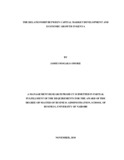| dc.description.abstract | Traditional growth theorists believed that there is no correlation between capital market development and economic growth because of the presence of level effect and not the rate effect. Many viewed stock market as an agent that harm economic development due to their susceptibility to market failure, which is often manifest in the volatile nature of stock markets in many developing countries. Contrary to traditional view, there are evidences that support the hypothesis that there exist long-run correlation between stock market development and economic growth. But in literature the testing of this hypothesis is rare for developing countries. This study therefore aimed at answering the question on whether there is a relationship between capital market development and economic growth in Kenya. Causal research design was used for this study.
The population of the study was all the listed firms at the Nairobi Stock Exchange for the period 2004-2009. The Central bank of Kenya provided economic growth figures for the same period. There are 47 listed firms at the Nairobi stock exchange. The sampling procedure for this study was simple random sampling. The researcher used financial institutions that had been listed in the NSE in the years between 2004 and 2009 to come up with the sample size. The sample size for this study was therefore 8 financial institutions and the sample period was 2004-2009. Secondary data was used for this study.
The data collected for the study was analyzed using a multivariate regression model. Statistical package for social sciences (SPSS) version 17 was used to aid in analysis of the data. The independent variables of this study are market capitalization, trading volume, and change in stock market prices. Where Y was economic growth indicated by GOP per capita growth and GOP growth rate, Xl was market capitalization, X2 was trading volume, and X3 was change in stock market prices. This study concludes that capital market development affects the growth of the financial sector. This study also revealed that market capitalization, change in stock market price and trading volume affect economic growth. | en_US |

